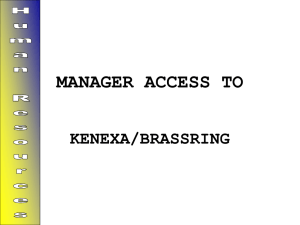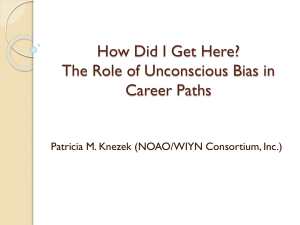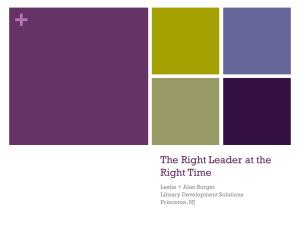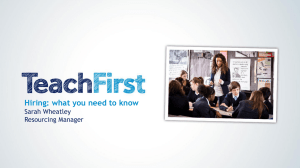Guidelines for Interviewing Music Teachers
advertisement
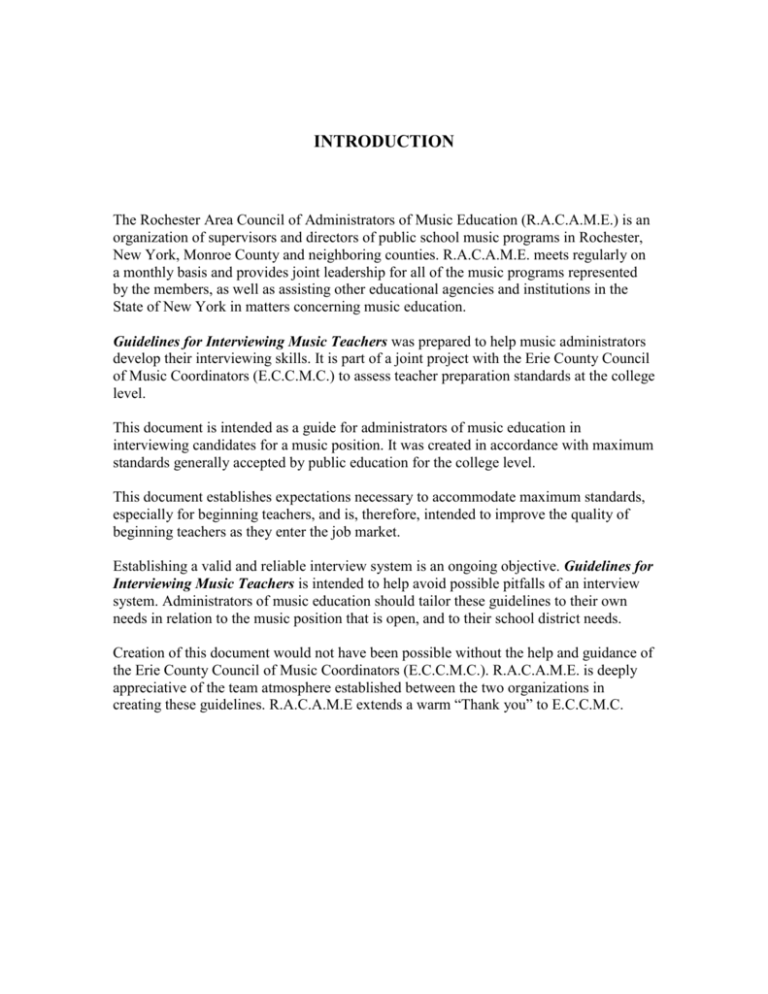
INTRODUCTION The Rochester Area Council of Administrators of Music Education (R.A.C.A.M.E.) is an organization of supervisors and directors of public school music programs in Rochester, New York, Monroe County and neighboring counties. R.A.C.A.M.E. meets regularly on a monthly basis and provides joint leadership for all of the music programs represented by the members, as well as assisting other educational agencies and institutions in the State of New York in matters concerning music education. Guidelines for Interviewing Music Teachers was prepared to help music administrators develop their interviewing skills. It is part of a joint project with the Erie County Council of Music Coordinators (E.C.C.M.C.) to assess teacher preparation standards at the college level. This document is intended as a guide for administrators of music education in interviewing candidates for a music position. It was created in accordance with maximum standards generally accepted by public education for the college level. This document establishes expectations necessary to accommodate maximum standards, especially for beginning teachers, and is, therefore, intended to improve the quality of beginning teachers as they enter the job market. Establishing a valid and reliable interview system is an ongoing objective. Guidelines for Interviewing Music Teachers is intended to help avoid possible pitfalls of an interview system. Administrators of music education should tailor these guidelines to their own needs in relation to the music position that is open, and to their school district needs. Creation of this document would not have been possible without the help and guidance of the Erie County Council of Music Coordinators (E.C.C.M.C.). R.A.C.A.M.E. is deeply appreciative of the team atmosphere established between the two organizations in creating these guidelines. R.A.C.A.M.E extends a warm “Thank you” to E.C.C.M.C. TABLE OF CONTENTS PREPARATION…………………………………………………1 1. 2. 3. 4. Preliminary Considerations…………………3 Professional Observation……………………3 What to look for……………………………..3 Interview Process……………………………4 GENERAL INQUIRY………………………………………...…4 5. 6. 7. 8. 9. 10. 11. Educational Background…………………….4 Past Experience……………………………...5 Reliability/Willingness to Work/Initiative…..5 Classroom Management/Discipline………….6 Curriculum…………………………………..7 Emotional Stability/Personal Qualities………8 General Questions for All Areas……………8 SPECIFIC INQUIRY…………………………………………….9 12. 13. 14. 15. 16. 17. 18. 19. Instrumental, Winds & Percussion…………..9 Choral Music/Vocal………………………...10 Instrumental, Strings………………………..11 Classroom Music………………………...…12 Demonstration of Skills/Performance……...13 Technology………………………………....14 Standards and Assessment……………….....14 Closure…………………………………..….14 SUGGESTED MUSIC APPLICATION SUPPLEMENT………15 Guidelines for Interviewing Music Teachers Prepared by The Rochester Area Council of Administrators of Music Education Preparation 1. Preliminary Consideration 1.1 - The application form must be completed in advance of the interview. 1.2 - Study application form, transcript, and recommendations in advance of the interview. 1.3 - 1.4 - Avoid preconceived notions when looking for the right teacher. It is recommended that a MUSIC APPLICATION SUPPLEMENT be included with the school application form. (See sample SUPPLEMENT on page 10.) 2. Professional Observation 2.1 - Candidate should be observed in an actual teaching situation. 2.2 - If this is not possible, the candidate should be requested to prepare a VIDEO TAPE in advance of the interview of a complete classroom lesson or rehearsal (not a performance). 3. What to look for 3.1 - College attended, program completed 3.2 - Outside activities 3.3 - Person(s) responsible for recommendation(s) 3.4 - Look for specifics in recommendations 3.5 - Location of student teaching: time span; duties 3.6 - Special attention to statement on why applicant applied for “this” position 3.7 - Repertoire 3.8 - Major instrument(s)/ minor instrument(s) 3.9 - Neatness; spelling; grammar 3.10 - Candidate should be requested to enclose past programs of performances. 4. Interview Process 4.1 - Create a warm and friendly atmosphere for the interview; greet candidate personally. 4.2 - Major objective: get candidate to talk. 4.3 - Take thorough notes; write your impressions; rate according to your school’s rating system, or your own rating system. 4.4 - Avoid talking excessively. 4.5 - Performance: prepared solo on major instrument, and/or voice. This is included as an option for the Supervisor or Director of Music. 4.6 - Always allow candidate to ask questions at conclusion of interview. (Quality and quality of questions are an important indicators.) 4.7 - Avoid offering position on first interview. General Inquiry 5. Educational Background 5.1 - Describe your public or private school training at the elementary, junior high/middle school, and high school levels. 5.2 - Describe the college degree(s) you hold at the present time. 5.3 - Have you done any advanced study beyond your last degree? 5.4 - What are your major and minor instruments? 5.5 - Describe your background in music theory and music history. 5.6 - Describe your background in piano and the social instruments? 5.7 - To which professional organizations do you belong? To what professional organizations would you like to belong? 5.8 - With what kinds of technology are you familiar? 5.9 - When did you last attend a workshop, seminar, or conference? Describe your experience. 6. Past Experience 6.1 - What are your impressions of the ensembles you performed with at the elementary level; JH/MS level; HS level; college level? 6.2 - 6.3 - Of what musical and/or educational accomplishments are you most proud? 6.4 - What was your greatest challenge? 6.5 - How would you describe your relationship with your peers? 6.6 - How long did you have your first teaching position, and when did you leave? What was your position? What did you do? 6.7 - What are your reasons for leaving your present position? Is there anything you did not like, or disagree with as a student at these various levels? 7. Reliability/Willingness to Work/Initiative 7.1 - What is your present position? What are your reasons for applying here? 7.2 - Other than classroom duties, what other responsibilities have you assumed? How long? What? 7.3 - Have you ever been asked to resign? 7.4 - Have you ever resigned from a job? Why? 7.5 - Did you work outside of school as a JH/MS or HS student? 7.6 - Did you work during college; number of hours weekly? 7.7 - How do you feel about evening or weekend activities such as festivals? 7.8 - How do you feel about lunch duty, club sponsorship, etc.? 7.9 - On what types of student/faculty committees have you served or would like to serve? 7.10 - How important are ensembles out-of-town trips to you as a teacher? 7.11 - How do you feel about competition and/or evaluation as a student? How do you feel about competition for your students? Assuming your students are performing, how important is it for the teacher to be in attendance at a solo and ensemble festival? 7.12 - How do you feel about performing at non-department events such as parades and sporting events? 7.13 - How would you feel about conducting the pit orchestra for the school musical? How would you feel about producing a school musical? 7.14 - Describe what you perceive your duties will be if you are offered this position. 7.15 - Would you be willing to teach outside your field (e.g. vocalist teaching instrumental music)? 8. Classroom Management Discipline/Teaching Strategies 8.1 - What kind of discipline do you require to do a good job of teaching? 8.2 - What do you consider a proper classroom atmosphere for learning? 8.3 - What rules do you personally have for your classroom? 8.4 - Describe a past discipline problem with a student. What were your steps in attempting a solution to the problem? Name them in chronological order. 8.5 - Who is responsible for school discipline outside your classroom? 8.6 - What are your procedures for starting an ensemble rehearsal? 8.7 - Describe your approach to organization and planning relative to _____________ (lesson preparation, grading, etc.) 8.8 - What would you do if a student advised you twenty four hours in advance of a concert that he/she could not be in attendance at the concert? 8.9 - How does organization and planning relate to management and discipline? 8.10 - Describe your experience in student teaching or a previous position with the classroom management of special populations and exceptional children. 8.11 - What does Madeline Hunter, Howard Gardner, multiple intelligences, “students at risk”, William Glasser, Assertive Discipline mean to you? 8.12 - What kind of administrative support do you require, or prefer, to help you function optimally in the classroom? 8.13 - How would you incorporate technology into your classroom? 9. Curriculum 9.1 - Why is music important to the total school curriculum? 9.2 - What is the role of music relative to the total school program? 9.3 - What are the key components of a comprehensive music program? 9.4 - Have you ever had the opportunity to write curriculum? If so, discuss your contribution. 9.5 - 9.6 - Would you be willing to adapt your teaching methods to a district curriculum and district approved materials? If an opportunity to write curriculum were available, would you apply to participate? Would you be prepared to participate? 10. Standards and Assessments 10.1 - How do you incorporate the standards into your daily teaching? How are they assessed? 10.2 - Have you ever developed a rubric? How do you use it? 10.3 - In your past experience in a performing organization, did your conductor employ the technique of reflection? 10.4 - Have you incorporated reflection into your performing organization experiences? 10.5 - How have you incorporated Standard 4 into your teaching? 11.Emotional Stability/Personal Qualities 11.1 - How would you react to a student who challenges your authority in class? 11.2 - What would you do if a child or parent accused you of being unfair? 11.3 - Describe some personality characteristics you find undesirable in people. 11.4 - If you could change your personality one way to help you get along better with people, what would you change? 11.5 - What do you feel would be your most difficult task with this job? Why? 11.6 - What do you see as your greatest asset in teaching? 11.7 - How do you feel about your favorite teacher(s)? Why? 11.8 - What makes teaching enjoyable for you? 11.9 - All teachers have strong and weak qualities. What are your weaknesses? 11.10 - To what type and level of student do you relate best; least? 11.11 - Describe personal qualities you have noticed in bright students and in students with learning difficulties. 12. General Questions for all Areas 12.1 - Why do you want to teach? 12.2 - Describe the place of music in the students’ overall curriculum. 12.3 - How would you work with other teachers to integrate curriculum? 12.4 - Describe the type of music and/or selections you would use to program a spring concert (Elementary, and/or Middle School/Junior High or High School). Establish the order of the performance. 12.5 - Where would you go to find help in the selection of literature to perform? 12.6 - Describe your knowledge of basic harmony and theory; of basic music history. 12.7 - What are some of the most common problems observed in student performance? 12.8 - Can you identify any strengths or weaknesses in the program to which you are applying? 12.9 - Have you been involved with extra activities: e.g. NYSSMA solos, All County, All State, Major Organization Festivals, musicals? 12.10 - How would you adjust your teaching style for mainstreamed learning disabled children? 12.11 - How would you adjust your teaching style for inclusion students? 12.12 - How will you foster musical sensibility in students? 12.13 - What is your background in various learning styles? Do you know what your specific learning style is? Specific Inquiry 13. Instrumental, Winds and Percussion 13.1 - Describe how you would go about teaching breath support. 13.2 - Describe how you would go about teaching tonguing in relation to breath support. 13..3 - Ideally, where should the tongue strike when playing the flute; clarinet; trumpet; tuba? 13.4 - Describe the ideal embouchure for flute, clarinet, trumpet, saxophone. Describe hand positions for traditional and matched grips for drumsticks. 13.5 - Describe how you would go about teaching embouchures to a trumpet student who is changing instruments to tuba; likewise for clarinet to saxophone. 13.6 - To what extent are you familiar with percussion instruments such as the snare drum, bass drum, timpani, xylophone? Demonstrate the following drum rudiments: five stroke roll, long roll, flam, and paradiddle. 13.7 - There are two schools of thought regarding the tapping of the foot. To which school do you belong? 13.8 - What lesson book, or method sequence do you prefer at the elementary level; J H/MS level; HS level? 13.9 - Of all the elements that are important to instrumental music such as embouchure, tone, rhythm, intonation, etc. which is the most important to you? 13.10 - How will you foster musical sensitivity in students? 14. Instrumental, Strings 14.1 - Why should we teach strings as part of our music program? 14.2 - What are the advantages and disadvantages of homogeneous and heterogeneous string instruction? 14.3 - What are the functions of private and class string instruction in the overall preparation of players? 14.4 - Rote instruction is part of the Suzuki method, but is not unique to it. Describe other elements of the Suzuki method and discuss how they might apply to your own teaching. 14.5 - What do you think about establishing a string vs. full orchestra? When? How? 14.6 - What are the benefits of an orchestral experience for wind and percussion students and what are the benefits to the wind/band program? 14.7 - Describe a student recruitment demonstration. What would one hear and see if he/she were watching a demonstration to the 4th and 5th grade students? 14.8 - What lesson book do you prefer at the elementary level MS/JH; HS? 14.9 - Describe the type of music or selections you would use to program a spring concert (elementary; MS/JH; HS). 14.10 - Where would you go to find help in the selection of performance literature? 14.11 - What string instrument do you play well enough to model for a beginning string class? When was the last time you played a string instrument other than your major instrument? 14.12 - Students in this district have ______ minute lessons _______times per week. In addition to specific repertoire, what would your first year string students be able to do at the end of the year? What specific elements of string techniques would they have mastered? Which elements of string techniques might be “under development”? 14.13 - Compare and contrast forward and backward extensions on the cello. 14.14 - Compare and contrast the bow holds for violin, viola, cello, and double bass. 14.15 - Describe for me a fingering for the following scales on the violin, the viola, the cello and the double bass. Assume the skills of a first or second year player. Violin: F Major, beginning on D-string (involves Low 1 on the A & E and low 2 on the D) Viola : F Major, beginning on the D-string (involves Low 1 on A and a shift to third position on the A) (or the scale could start on the C-string with a low 2 on the G and D) Cello: A Major (involves forward extensions, possible shift) Bass: Bb Major ( involves 1/2 position) 15. Choral Music/Vocal 15.1 - Discuss your vocal training 15.2 - What are your goals/expectations for yourself, and your students as you begin developing your vocal music program? 15.3 - Describe your procedure for introducing a new song. 15.4 - Describe your concept of choral sound. 15.5 - Describe your concept of a beautiful tone (for a specified age level). 15.6 - (If an experienced teacher) List your program repertoire from last year. What were the challenges, or most easily achieved aspects of the music. 15.7 - How do you teach sight-reading during a rehearsal? 15.8 - What warm-ups do you use and what purpose does each serve? 15.9 - Describe the content of your voice classes. How do you teach vocal sound production? 15.10 - How do you teach diction to your chorus? What are some diction problems in choral singing and how do you solve them? 15.11 - What is your philosophy regarding the performance of music in foreign languages? Do you incorporate foreign language songs in your program? 15.12 - How will you handle the sensitive issue of programming sacred/secular music? 15.13 - Intonation, balance, vowel uniformity, and breath support are primary concerns for a chorus. How do you address these when teaching a large chorus? 15.14 - How would you select music for your group? What are the program priorities that determine your repertoire? 15.15 - In what ways do you use the piano in chorus rehearsals? 16. Classroom Music 16.1 - What are your goals and objectives as you begin to develop a comprehensive classroom music program? 16.2 - What music activity skills would you include in a (Elem., JH/MS) level curriculum? 16.3 - Are you familiar with the NYS Middle School/Junior High School Music Curriculum; The NYS Music in Our Lives Curriculum; The NYS High School curriculum; Orff, Jacques-Dalcrose; Gordon; Manhattanville? 16.4 - How would you introduce note reading and rhythmic reading? What are some other ways of doing this? Are you familiar with other note reading techniques/methods? 16.5 - Are you familiar with the major music textbook such as Silver Burdett, Holt, etc ? Relate your experience with these books. Do you prefer one over the other? 16.6 - (Review the elementary music curriculum with the candidate.) Turn to page ____. Describe a lesson plan that works toward these instructional objectives. 16.7 - Can you identify any strengths or weaknesses in our classroom music program? 16.8 - Are you, or have you been involved with extracurricular activities (e.g. NYSSMA solos, All-County, State, Major Organization Festivals, musicals, choreography, bulletin boards) ? 16.9 - Describe a typical 40-minute general music class (activities, teacher/student interaction, etc.). 16.10 - Describe the different musical abilities you would expect to find in a group of 25 general music students; in a 50-voice chorus? 16.11 - Describe the different musical abilities you would expect to find in a third/ sixth; eighth grade class. 16.12 - What are some personality characteristics that you’d expect to find in a group of 25 general music students; in a 50 voice chorus? 16.13 - What do you like about elementary students? What don’t you like about elementary level students? Repeat for JH/MS or HS students. 17. Demonstration of Skills/Performance (This section is included as an option for the interviewer.) 17.1 - Candidate should be observed in an actual teaching situation and/or conducting a rehearsal. 17.2 - If #1 above is not possible, the candidate should be requested to prepare a video tape in advance of the interview of a complete classroom lesson or rehearsal (not a performance). 17.3 - Candidates should perform a prepared solo on their major instrument, and/or voice. This section is included as an option for the interviewer. 17.4 - General music applicants and vocal music applicants should audition on the piano (including sight-reading). 18. Closure 18.1 - Advise the candidate as to when they may expect a final decision. 18.2 - If necessary, advise the candidate on what to expect in completing the district’s interview system. 18.3 - Advise the candidate that it is not necessary to call. The district will respond appropriately. Suggested Music Application Supplement Name __________________________________ Telephone (_____)________________ Position You are Seeking: _________________________________________________ Colleges Attended: ____________________________________ Contact Person ______________________ ____________________________________ Contact Person ______________________ ____________________________________ Contact Person ______________________ Major Instrument: _______________________ Teacher: ________________________ Minor Instruments: _____________________ _____________________ _____________________ _____________________ Piano Competency: Excellent: ______ Good ______ Fair ______ Weak _______ Student Teaching: Date: ___________ Location: _______________________ Address: __________________________________________ Give Number of Years Employed as a Teacher in Any of the Following Areas: Classroom Music: K-6 _____ 7-8 _____ Vocal _____ JH/MS _____ HS _____ Instrumental: Elem _____ JH/MS _____ HS _____ Marching Band JH/MS _____ Strings: Elem _____ JH/MS _____ HS _____ Theory _____ Music Theatre _____ Chamber Chorus _____ Swing Choir _____ Jazz Ens. _____ Other _____ List three to five people in the music field who can speak for you: Name ________________________________ Phone ________________________ Name ________________________________ Phone ________________________ Name ________________________________ Phone ________________________ Please give any other pertinent information that would qualify you for this position:

